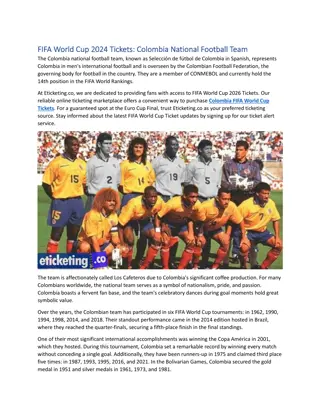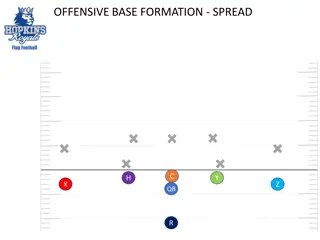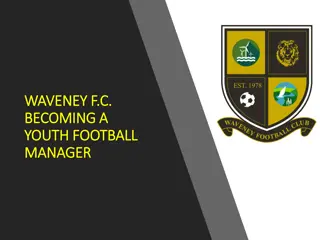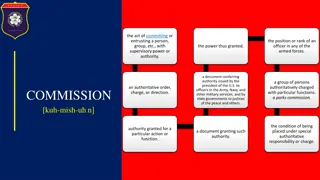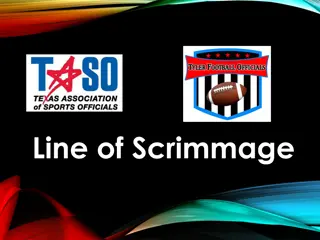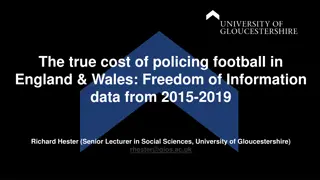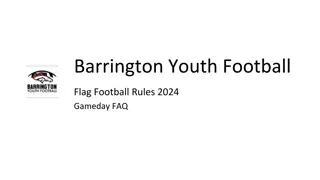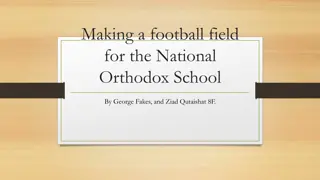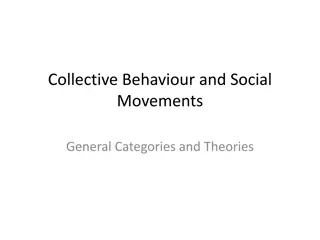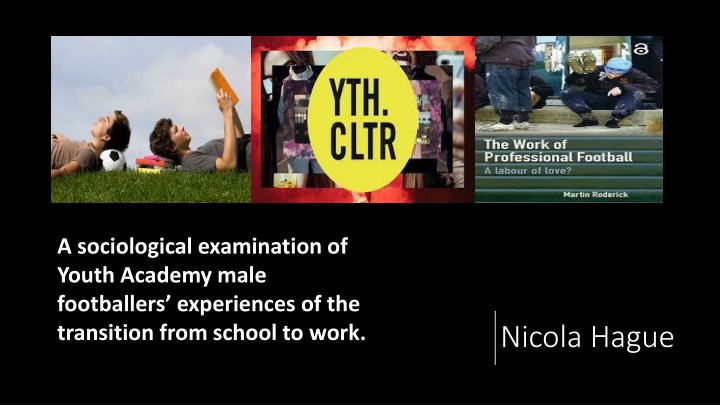
Exploring Transition Experiences of Youth Academy Footballers
Delve into the experiences of male youth academy footballers as they transition from school to full-time youth teams, highlighting the challenges and opportunities they face. This sociological examination sheds light on the complexities of pursuing a career in professional football and the impact it has on young players. Discover key findings and insights from in-depth qualitative research conducted with Championship football club members.
Download Presentation

Please find below an Image/Link to download the presentation.
The content on the website is provided AS IS for your information and personal use only. It may not be sold, licensed, or shared on other websites without obtaining consent from the author. If you encounter any issues during the download, it is possible that the publisher has removed the file from their server.
You are allowed to download the files provided on this website for personal or commercial use, subject to the condition that they are used lawfully. All files are the property of their respective owners.
The content on the website is provided AS IS for your information and personal use only. It may not be sold, licensed, or shared on other websites without obtaining consent from the author.
E N D
Presentation Transcript
A sociological examination of Youth Academy male footballers experiences of the transition from school to work. Nicola Hague
180 out of 1.5 million (0.012%) Youth Academy players will makeit in the English Premier League (BT Sport Films 2018). Football apprenticeships are unique: players are marketable assets and there is no guaranteed job post-completion (Parker 1996). Why study transitions? Existing literature focuses mainly on transitions into and out of first teams (Roderick 2006; Hickey and Kelly 2008). Rationale: transitions allow us to examine the prevalence of subcultures and thus how footballers identify as a footballer. Rationale: Youth is an impressionable life stage where decisions take place and individuals learn more of themselves through their relations with space(s) and people (Lahelma and Gordon 2003). Research question: What are the experiences of male youth academy players during their transition from full-time school to full-time youth team? All images taken from Google search
Transitions Success rates are extremely low; transitions out of football can be extremely detrimental to individuals (Platts 2012; BT Sport Films 2018). Elite professional sporting cultures: What do we know? Existing literature predominantly psychology-based and discusses coping methods, levels of motivation and stressors (Morris, Tod and Eubank 2017). Dreams vs Reality and Occupational Inevitability Assumption that successful enrolment in an academy = successful high level playing career (Parker 1996). The Football Environment and A Footballer s Identity Chasing the Big Time (Parker 1996)- players accept and normalise authoritarian practices that are common place within clubs- military type discipline, intimidation. Institutionalised? Image/ Identity management (Law 2018) Conspicuous consumption and role models. Successful players are idolised by those aspiring to achieve the same status.
FIGURATIONAL SOCIOLOGY- NORBERT ELIAS Figurations- a group or network of mutually orientated and dependent people (Elias 1978). Interdependencies- two way links between individuals within a network that are based on relations of power (Elias 1978). Habitus- embodied social learning or second nature (Elias 1978) Theoretical Framework and Methodology METHODOLOGY Qualitative case study of one Championship football club. Semi-structured interviews -gold standard of qualitative data collection (Sparkes and Smith 2018). 12 players out of a possible 26 were interviewed and were aged 17-19. Criterion, purposive, convenience sampling: all male participants, aged at least 16 on the date of interview, on a two-year contract with the club. Thematic Analysis using NVivo 12.
Key Findings Transitional Experiences 3 types of transition identified: A smoother transition A more difficult transition An initial transitional shock
Roderick (2006) and Clarke, Cushion and Harwood (2018) argue that immersion in a sporting football environment contributes towards a football habitus; an athletic identity. A smoother transition I started when I was about 7 I think, started playing for a local team where my dad was like the manager, he had a professional footballing career (player 4) By experiencing few or no criticalmoments some players perceived their transition as relatively smooth (Pummel, Harwood and Lavallee 2008). the transition was quite easy everything was still here for me, I was still at home (player 12)
Belonging to the figuration was very important to the new scholars. However, new first years entering the figuration creates new interdependencies that enable and constrain the action of others, demonstrating the presence of power imbalances (Law and Bloyce 2019). A more difficult transition [before] I was able to play pre-games all week and it wouldn t be a problem, whereas I d play two games here and I d be absolutely blowing (player 3) they ll go righttoday s a low-key day , nothings low- key cos you put your best in everything that s what sets other players apart (player 7) It was hard adjusting for the first couple months... obviously you re away from all your friends, who you ve been with your whole life (player 2)
Elias (1978) argues that youth transition into adulthood is anything but linear. An initial transitional shock The role of adults and strong players already at the club arguably perpetuates between individuals (Elias and Scotson 1965; Goodwin and O Connor 2015). power balances The competitive nature of being in this environment I was really taken aback by it. I was really, really shocked at home like I was probably one of the best players coming into every single game playing for my local club. When I came here it was just a different level and like I ve been so used to being the main player, getting praise every single game, and then to come here and to have players that are miles, miles better than me, technically, physically I was really, really shocked (player 10)
Early specialisation has a profound effect on the players perceptions of their transition. This resulted in the internalisation of hegemonic masculinity and influenced their football habitus. Conclusions The formation of new interdependencies with new players/ members of staff during their transition accounted for the transition the players experienced.
Thank you for listening. Any questions? n.hague@yorksj.ac.uk
Adams, A. and Carr, S. (2017) Football friends: adolescent boys friendships inside an English professional football (soccer) academy. Soccer and Society, 20 (3), pp.1-24. Clarke, N.J., Cushion, C.J. and Harwood, C.G. (2018) Players understanding of talent identification in early specialization youth football. Soccer and Society, 19 (8), pp.1151-1165. References Elias, N. (1978) What is Sociology? London, Hutchinson and Co. Elias, N. and Scotson, J.L. (1965) The Established and the Outsiders. London, Sage. Goodwin, J. and O Connor, H. (2015) Norbert Elias s Lost Research: Revisiting the Young Worker Project. Surrey, Ashgate Publishing Ltd. Hickey, C. and Kelly, P. (2008) Preparing to not be a footballer: higher education and professional sport. Sport, Education and Society, 13 (4), pp.477-494. Lahelma, E. and Gordon, T. (2003) Home as a Physical, Social and Mental Space: Young People s Reflections on Leaving Home. Journal of Youth Studies, 6 (4), pp.377-390. Law, G. (2018) A sociological analysis of the monetisation of social relations within the working lives of professional footballers. PhD thesis, University of Chester. Law, G. and Bloyce, D. (2019) Game Models as a framework for understanding power in the male football figuration. In: Malcolm, D. and Velija, P. ed. Figurational Research in Sport, Leisure and Health. Abingdon, Oxon, Routledge, pp.34-44. Morris, R., Tod, D. and Eubank, M. (2017) From youth team to first team: An investigation into the transition experiences of young professional athletes in soccer. International Journal of Sport and Exercise Psychology, 15 (5), pp.523-539. No Hunger in Paradise (2018) London, BT Sport, 18th January. Parker, A. (1996) Chasing the Big-Time : football apprenticeship in the 1990s. PhD thesis, University of Warwick. Platts, C. (2012) Education and welfare in professional football academies and centres of excellence: A sociological study. PhD thesis. University of Chester. Roderick, M. (2006) A Very Precarious Profession: Uncertainty in the Working Lives of Professional Footballers. Work,Employment and Society, 20 (2), pp. 245 265. Sparkes, A.C., and Smith, B. (2018) Qualitative Research Methods in Sport, Exercise and Health: From Process to Product. 2nd ed.London, Routledge.


